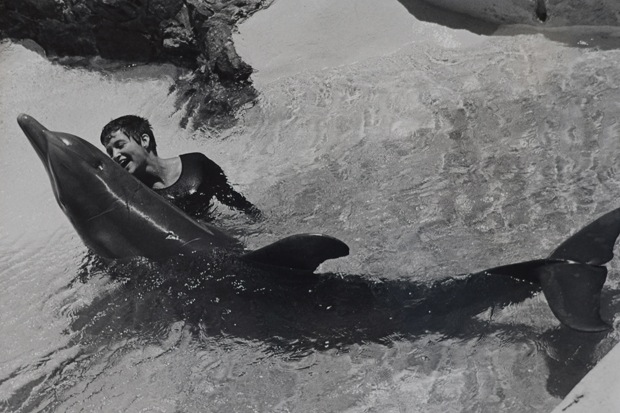So I’m looking at the seasonal TV schedules trying to find something — anything — to watch.
Britain and the Sea? Probably very well done, but David Dimbleby is such a dangerously feline, OE-manqué, Flashmanesque, living-embodiment-of-the-BBC closet pinko that reviewing it would feel wrong, somehow, like chipping into a fund to buy Chris Huhne an eighth home.
The Doctor Who Christmas Special? But it always makes me want to kill myself. I hate the idea that a Dalek garlanded in tinsel might burst into the Cratchit household with a fat goose dangling from its exterminator gun while the White Witch’s frozen heart melts and all the crippled children are released from the snowy mountain — or whatever mawkish crap they’ve got planned for us this year.
Two films about The Great Train Robbery: A Robber’s Tale; A Copper’s Tale? Yeah, but we already know what happens, don’t we? They steal lots of money but then one by one they all get caught.
PQ 17: An Arctic Convoy Disaster. What? Wait, this is more like it. And who is presenting this very promising-sounding documentary on one of Britain’s biggest wartime cock-ups? Jeremy Clarkson?? Hallelujah! Thank you, Father Christmas. And you, Baby Jesus. Maybe there will yet be some Yuletide joy in the Delingpole home, after all…
Most of you, I imagine, know the basic story. In July 1942, 153 merchant seamen on the Arctic Convoy were sent needlessly to their deaths as a result of an ill-judged order by the First Sea Lord Sir Dudley Pound.
Pound had been spooked by reports that the Tirpitz, pride of the German battlefleet, was on its way to engage convoy PQ 17. Had this been true, it would have been disastrous for the Anglo–American convoy — not only for the ageing, rustbucket merchant ships ferrying supplies to the Soviets, but also for their destroyer and cruiser escort. None of the Allied ships would have been any match for the Tirpitz with its 14in armour and its eight 38cm guns capable of lobbing a shell 25 miles…
But no intelligence could be found to confirm this rumour, which makes Pound’s order for the cruiser escort to withdraw, then for the convoy to scatter, so bizarre. Some say Pound was a weak commander, promoted above his capabilities, because Churchill wanted a man at the Admiralty he could manipulate. Pound was also exhausted and weakened by a brain tumour, which would kill him the next year. This was to prove fatal for 24 out of the 35 merchant ships on PQ 17.
In the great second world war scheme of things, 153 lives lost is not a big number (the sinking of the Lancastria, remember, claimed over 4,000), but what a horrible way for those poor men to go. This is where Clarkson came in: shivering and unsteady on the frozen deck of an Arctic icebreaker, inviting us to imagine just how much grislier it would be if instead of wearing state-of-the-art, 21st-century protective gear, you had to do it in little more than a balaclava and a coat made from horse blanket, in seas so rough the peaks of the waves were as high as the bridge, constantly having to chip away at the accumulated ice to stop the ship becoming top-heavy and rolling over.
So life on an Arctic merchantman was grim enough even before you factored in the Luftwaffe torpedo bombers and the U-boat wolf packs and the near-certain knowledge that, if your ship sank, no one was going to stop and pluck you from the icy seas. And as if that weren’t cruel enough, in the unlikely event you did survive, your pay would have been stopped from the moment your ship went down.
No wonder the Royal Navy and US Navy escorts felt such hideous pangs of guilt and betrayal when the bizarre order came to turn tail and abandon the merchantmen to their inevitable fate. Clarkson being Clarkson, though, he wasn’t going to let this depressing episode pass without including a tale of British pluck and ingenuity. When he covered Arnhem a few years back, the representative hero he found was his ex-father-in-law Major Robert Cain VC. This time it was Leo Gradwell, a 42-year-old lawyer serving with the RNVR in command of an armed trawler.
When the convoy scattered, Gradwell hit on the inspired idea of heading not for port but to the last place the enemy would expect — deeper into the Arctic Circle. It was a huge risk for an amateur sailor with no charts, but it saved the lives of his crew and of the three US merchantmen who accompanied him. They painted their ships white to frustrate German spotter planes; and eventually snuck into Archangel a month later. Gradwell got a DSC and, more importantly, the satisfaction of having hazarded all, not out of self-preservation but out of duty and a sense of responsibility to others, and, against impossible odds, having emerged triumphant.
Merry Christmas, everyone: and may all your futures resemble Leo Gradwell’s — and never Dudley Pound’s…







Comments